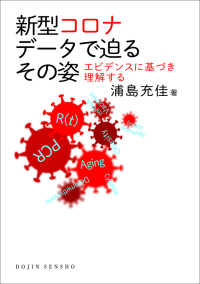Full Description
Given the rapidly evolving global education landscape, characterized by technological advancements, shifts in educational policies, socio-political transformations, and increasing emphasis on equity and inclusion, this volume provides scholars and practitioners with a comprehensive and reflective analysis of key issues driving educational change.
The Annual Review of Comparative and International Education 2024 (ARCIE 2024) advances scholarship in comparative and international education by providing a structured and comprehensive review of major developments. Specific purposes of ARCIE 2024 include: (1) synthesize key research trends by offering in-depth analyses of current debates, unresolved issues, and significant contributions in the field; (2) bridge the research-to-practice gap by identifying pathways to translate empirical findings into policy and practice in diverse educational contexts; (3) examine regional and global educational dynamics by showcasing how unique political, social, and economic factors shape education across different regions; and (4) explore emerging issues by addressing underexplored topics and methodological innovations that redefine comparative education research.
The Annual Review of Comparative and International Education 2024 serves as a critical, timely contribution to the field of comparative and international education by synthesizing emerging trends, theoretical developments, and practical applications that shape education systems worldwide.
Contents
Chapter 1. Rhizomes and Realignments in Comparative and International Education; Alexander W. Wiseman
Part 1. Comparative Education Trends and Directions
Chapter 2. Rethinking the National in Comparative Education; David A. Turner and Xiaomin Li
Chapter 3. The 'International School' At 100: How Myth Has Shaped the Field and Future Implications; Iman Azzi
Part 2. Conceptual and Methodological Developments
Chapter 4. The Programme for International Student Assessment (PISA): A Scientific (Counter)Model for Research in Comparative Education?; António Teodoro, Daniel Bart, and Teresa Teixeira Lopo
Chapter 5. Exploring the Intersection of Comparative and Intercultural Education: Pursuing a Unified Methodological Model; Renata Nowakowska-Siuta
Chapter 6. Into the Light: The Expansion and Institutionalization of Shadow Education; Madhu Narayanan
Chapter 7. Beyond Rankings: A Multidimensional Framework for Comparing Higher Education Institutions and Systems; Lynette Jacobs, Tafadzwa Mutsvedu Ruzive, Cornelius Hagenmeier, and Nico Jooste
Chapter 8. Enmeshed worlds: Advancing a technographic approach capturing the global-local and socio-technical dynamics in comparative and international education; Pravindharan Balakrishnan
Part 3. Research-to-Practice
Chapter 9. Generative AI in Writing Assessment: Translating Research into Practical Applications in Global Education; Natalie Bidnick Andreas
Chapter 10. Parsing out Teacher Quality in Youth Participatory Action Research; Praveen K. Dubey, Angela R. Crevar, and Mattius W. Rischard
Part 4. Area Studies and Regional Developments
Chapter 11. From "All Under Heaven" to "Humanity's Common Destiny": Implications of Conceptions of World-ness in Chinese Traditional and Contemporary Thought for Global Citizenship Education; Donghui Zhang and Tanja Sargent
Chapter 12. Between Structural Dualism and Pedagogical Duality - Paradoxes of Language Functions in International Programmes: A Case of Poland; Joanna Leek
Chapter 13. Comparative and International Education: A Meta-Systematic Review of Educational Leadership and Management in Africa, 1960-2024; Anthony J. Onwuegbuzie and Ricardo David Sabates Aysa







